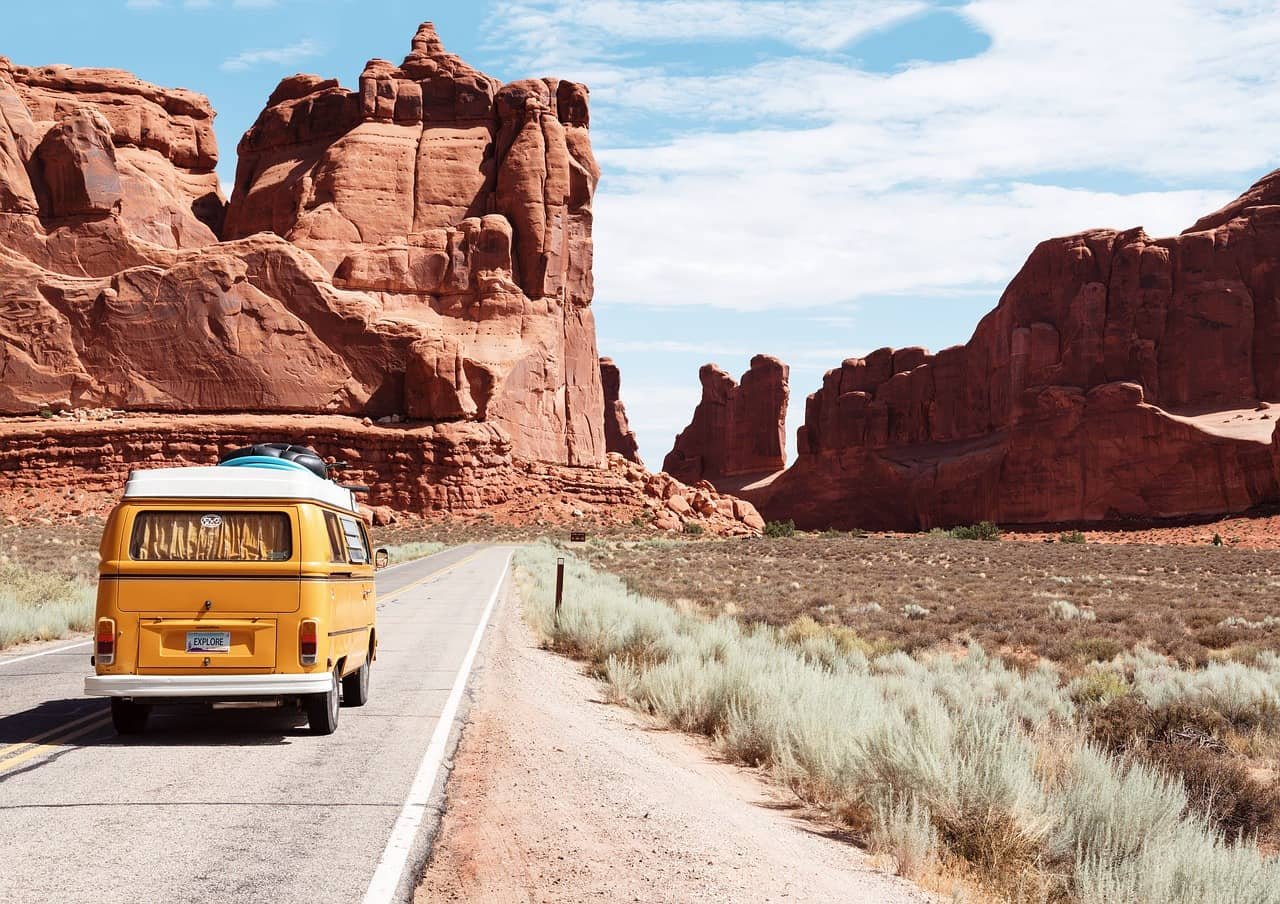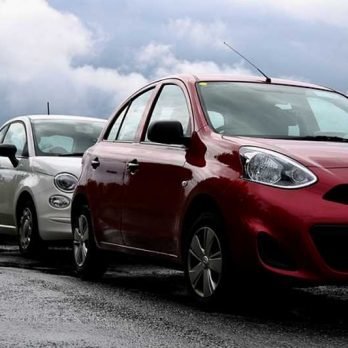Nothing beats the thrill of hitting the open road with your best buddies for an adventure. But if you care about the health of our planet, you can’t afford to drive recklessly. You don’t have to give up the pleasures of spending time with your friends or take a break from seeing exciting sights—you just have to be smart about it.
A sustainable road trip is one where you minimize your impact on the earth. It’s about enjoying yourself while respecting both the environment and other travelers on the road.

Why is Traveling Sustainably Important?
Let’s face it: the earth is in bad shape already. Many of our most precious natural resources are being destroyed, and there’s no way to get them back once they’re gone. We know this may not be news to you—if you love nature, you already limit your impact on it as much as possible.
But taking sustainability into account when traveling can be even more important than living sustainably at home. When you travel, especially by car, there are so many activities that use resources all over the world—and things like extra flights can just about cancel out any benefits you might have at home.
Traveling sustainably is important because it can offset some of the damage we do when on the road. If more people adopt sustainable practices while traveling, it will have a positive ripple effect on the planet.
Now more than ever, people should be concerned about their carbon footprint to lessen the damage they’re inflicting on the planet. Carbon footprint refers to the weight of carbon dioxide emitted as a result of a particular activity. You would be surprised to know that even the simple act of avoiding disposable containers and utensils could affect the planet. To help the planet heal, we should all adopt a low-carbon diet.
How can I make my Road Trip more Sustainable
Making a sustainable road trip may seem daunting, but it’s not as hard as you think. Fortunately, there are lots of things you can do to make your road trip more sustainable. Here are five easy tips to make your next trip greener.
-
Choose the Right Vehicle
Before you start planning your road trip, think carefully about what kind of vehicle you should take. If possible, choose a smaller (and more fuel-efficient) car or truck to take on your journey. You might even consider renting a car instead of taxi or buying one—or borrowing one from someone who already has one.
If you decide to buy a car for your road trip, make sure it’s an efficient model. It may cost extra upfront but will help keep costs low in the long run since it won’t guzzle gas like other vehicles.
Choosing the right type of fuel is also critical. It’s a mistake to settle for the cheapest gasoline you can find. You might think you’re saving money, but the truth is that the negative effects of cheap gas can cost you more in the long run. On the other hand, buying high-quality gasoline results in improved fuel efficiency aside from protecting your engine’s intake valves from carbon buildup.
-
Pack Light
One of the best ways to reduce your impact on the environment is to pack light. Not only will this save you money on baggage fees, but it will also help you avoid having to use extra fuel to move your stuff around.
Try to think about what you really need for your trip and leave the rest at home. If you can’t live without something, see if there’s a more sustainable way to transport it. For example, instead of packing your clothes in a suitcase, try folding them into a backpack or using a compression bag. And if you’re traveling with electronics, make sure they’re Energy Star certified.
-
Bring your own Food and Drinks
Food and drink are two of the biggest contributors to waste on road trips. But if you bring your own snacks and drinks, you can avoid creating a lot of unnecessary garbage.
Think about packing foods that are easy to transport and don’t need refrigeration. Snacks like fruits, vegetables, trail mix, and granola bars are great options. And for drinks, consider bringing reusable water bottles or coffee mugs instead of disposable cups and straws.
-
Make Smart Choices when Eating Out
Eating out is a big part of traveling, but it can also be one of the most unsustainable things you do. Restaurants typically use a lot of resources—from energy to water—to prepare food.
But there are ways to make smart choices when eating out. Look for restaurants that serve locally sourced food or have sustainable practices. And be mindful of how much you order. Just because you’re on vacation doesn’t mean you have to gorge yourself on every meal.
-
Plan Ahead
One of the best ways to make your road trip more sustainable is to plan ahead. If you have a specific route in mind, try to find hotels and attractions close to each other. This will help you avoid making unnecessary trips and using extra fuel.
You can also save energy by planning your trips around daylight hours. And if you can, try to avoid flying altogether and take public transportation or drive instead.
It will also help if you have a checklist so you can tick off the items as you pack them to make sure you don’t forget any essentials. This is to eliminate having to buy something that you could have brought from home.

Bonus: Consider making your Trip Plastic-free
If you want to make your trip as sustainable as possible, it’s also a good idea to go plastic-free. This can be challenging since most road trips involve using products with packaging and transporting food in disposable containers.
But there are ways around this. You can bring reusable containers instead of using plastic bags or foil pieces. And if you do choose to eat out, try to take leftovers back with you, so they don’t get wasted. Also, consider bringing along steel straws, metal sporks, and beeswax sandwich wraps you can make these beeswax sandwich wraps on your own if you have the time or just buy them online.
As it’s highly likely that you’ll be buying some items along the way, bring reusable eco-friendly shopping bags, so you can conveniently carry your purchases.
What should you avoid on a Sustainable Road Trip?
While you can reduce your impact on the environment by doing a few simple things, it’s important to be mindful of what you shouldn’t do. Here are seven examples of things to avoid while traveling sustainably:
-
Don’t let driving convenience override your concern for the planet
Sometimes it can be tempting to do things that make driving more convenient but aren’t great for the environment. For example, you might see a gas station with lower prices than other ones along your route and choose to stop there even though it’ll further impact Mother Earth.
Remember that sustainability is always important. If you want to lessen your environmental impact while traveling, stick with eco-friendly options no matter how inconvenient they are.
-
Don’t use disposable appliances like paper towels
When you’re on the road, it’s easy to let little conveniences override your concern for the environment. But if you really want to be sustainable, try staying away from disposable appliances whenever possible. Doing things like using paper plates and buying paper towels is not only wasteful but also impacts your carbon footprint.
-
Don’t forget about proper food storage
It can be tempting to eat at drive-thrus or buy snacks that aren’t very healthy or don’t need to be stored in the fridge when traveling. But if you want to be sustainable with your road trip, make sure you bring along reusable containers, so you don’t need to throw anything away after every meal.
-
Don’t overuse water
Water is an essential part of day-to-day life, but it’s important to be mindful of how much you use as a traveler. It might sound wise to pack as many bottles as possible and fill them with water from fountains or restaurants before you leave home, but this actually wastes a lot of resources.
If you’re going on a road trip, try using reusable mugs instead of disposable cups, and look for places where you can refill your own bottle rather than buying new ones.
-
Avoid bringing electronic appliances if at all possible
It can be tempting to bring everything but the kitchen sink when packing for a road trip, especially electronics. But these items use vast amounts of resources during manufacturing and transportation, so try to minimize the electronics you bring along whenever possible.
-
Don’t forget about personal hygiene
It’s easy to let convenience override your concern for the environment when you’re on a road trip. And while bringing reusable utensils is helpful, they don’t cover everything. For example, even though soap can be beneficial for sustainability, most people usually buy it in disposable containers. To avoid this problem, use bar soap instead of liquid or look for brands that sell their products in bulk. This way, you can avoid using too much without wasting any product.
-
Don’t rely solely on fossil fuels
If you want your road trip to be as sustainable as possible, it’s important to be mindful of the types of energy you’re using. For example, relying solely on fossil fuels to power your car or RV can hurt the environment in the long run. Besides, once you run out of whatever fuel you brought with you, it can be hard to find an eco-friendly replacement in rural areas.
Instead, consider powering your car or RV using renewable sources like wind and solar power. Doing so not only allows you to cut back on fossil fuels but is also more reliable than keeping a large supply of gasoline.
There are many sustainable options for powering your road trip vehicle, so make sure you do some research before setting out. You might be surprised by how many sustainable choices are available.
The Bottom Line
Sustainable road tripping may seem like a challenge at first, but with a little bit of research and preparation, you’ll find it’s not as hard as you think. It doesn’t even have to be complicated. By following these simple tips, you can reduce your impact on the environment while still enjoying your trip.
Author Bio:
Eun Rockwell is a content writer and academic author who use college essay writing services. She likes exploring new topics and is always committed to demonstrating her ability as a writer in new and difficult writing areas. Her favorites include reading novels and traveling.










